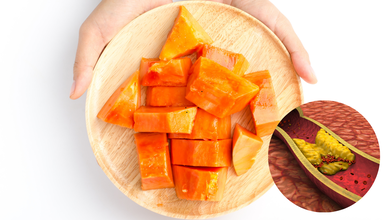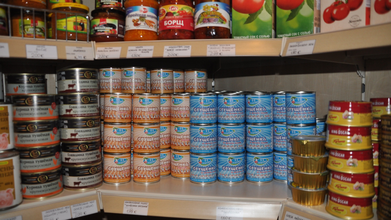- Health Conditions A-Z
- Health & Wellness
- Nutrition
- Fitness
- Health News
- Ayurveda
- Videos
- Medicine A-Z
- Parenting
Organic Carrots, Poultry, Ready-to-Eat Meats, Raw Milk: What’s Behind The Surge In Food Recalls In The US?

Food Recalls Are on the Rise, but is it Necessarily Bad News?
Food safety concerns are up and front in the country again, with recent recalls hitting the retail shelves of organically grown carrots, slivered onions, and liverwurst sold by brands that include Boar's Head and McDonald's. Some question whether these high-profile incidents herald deeper challenges for the U.S. food safety system. But experts caution not to panic-and they point to improvements in detection and response as reasons why recall news is so prominent.
While the increase in recalls may alarm, it could be a sign that foodborne illnesses are increasingly being found and handled faster rather than a sign of a failing system. Rutgers University food science department chair Don Schaffner said the tools of whole genome sequencing now allow health officials to pinpoint and track an outbreak with precision in a way that simply wasn't possible before. That quick identification allows public health officials to move fast-to interview victims, trace sources of contamination-when a problem surfaces.
Public health expert Craig Hedberg at the University of Minnesota comments that many of these outbreaks would have otherwise gone undetected. Advanced surveillance and laboratory analysis allow small clusters of illness to be linked directly to a source, so recalls can be issued and public advisories can be released on time.
"When these outbreaks are identified and investigated, steps can be taken to protect public health," Hedberg says. "That's why there's a strong interest in keeping the public informed." Food Recalls Are on the Rise, but is it Necessarily Bad News?
Outbreaks of foodborne illnesses are by nature hard to predict. According to Schaffner, the recent clustering of high-profile incidents could simply be coincidental and not indicative of a systemic problem.
The eating habits and food production also make their contribution to the changes in food safety. Food safety expert Darin Detwiler from Northeastern University points out that the more people choose ready meals and restaurant meals, the greater the complexity of food supply chains becomes. Ingredients travel further, go through multiple processing steps, and change hands several times before consumers get them, and the possibilities of contamination increase.
Is the patchwork approach to blame for food safety regulation?
The U.S. food safety system operates on an intricate network of agencies, each covering different aspects of regulation; the USDA focuses on meat and poultry, while the FDA monitors most other food items, including overseeing recalls. In outbreak situations, the CDC works in conjunction with local health departments to investigate and contain the spread of illnesses.
Despite this overall framework, gaps in food safety can occur. Civil litigation serves as a safety net when food-borne diseases slip through regulatory cracks. According to Timothy Lytton, a professor at Georgia State College of Law, liability suits compel food producers to adhere to strict safety standards. Insurance companies, which cover potential risks, will also help through counseling and the promotion of incentives to minimize the risk involved.
Protecting Yourself from Foodborne Illness
As regulatory agencies and companies continue to work on the safety of food, it also remains crucially important for consumers to be proactive at home. Here are some steps:
1. Monitoring Food Recalls: Stay on top of recalls through FDA updates and remove affected products from your kitchen.
2. Hygiene and Its Practices: Be sure to wash your hands thoroughly with soap and water before touching and after handling food.
3. Wash Fresh Fruits and Vegetables: Even those that are pre-washed should still be washed under running water to remove unseen bacteria, especially from crevices or wounded areas.
4. Prevent Cross-Contamination: Separate cutting boards and utensils must be used for raw meat and fresh fruits and vegetables.
5. Cook Food Properly: Meat, Poultry, and Seafood must be cooked to a safe internal temperature to kill harmful microorganisms.
While food recalls can be scary, they are also a reflection of advances in monitoring and responding to food safety. For instance, due to advances in technology and surveillance, outbreaks may now be detected and contained faster than ever before, thus mitigating the potential risks to public health.
Meanwhile, the increased complexity of the food industry underscores that vigilance needs to be taken at every step of the supply chain. With knowledge, safe food-handling practices, consumers can participate actively in protecting themselves and their families from foodborne diseases.
In the end, the increasing profile of food recalls is as much a story of solutions as of problems — reminding one and all that protecting our food supply is a shared responsibility that involves regulators, producers, and consumers.
What Is Zambezi Fig? The Underrated Fruit With Great Health Benefits

Credits: Canva
Superfoods often come from familiar shelves such as berries, nuts or leafy greens. Yet across parts of southern Africa, a humble wild fruit has quietly been part of traditional diets for generations. The Zambezi fig, found along the banks of the Zambezi River, is now gaining attention for its impressive nutritional profile and potential wellness benefits.
Though still relatively unknown outside its native region, nutrition experts believe this fruit deserves a closer look for people interested in natural, plant based health support.
Nutritional Powerhouse In A Small Fruit
The Zambezi fig contains an impressive range of essential nutrients including vitamins A and C, calcium and iron. These nutrients play key roles in daily body functions.
Vitamin C supports immune defenses and helps the body absorb iron. Calcium contributes to strong bones and teeth. Vitamin A supports vision and skin health. Iron helps prevent fatigue by aiding oxygen transport in the blood.
The fruit also contains natural antioxidants, compounds that protect cells from damage caused by environmental stress and metabolic processes. Including nutrient dense fruits like this in your diet may help meet daily requirements while adding variety to meals.
Natural Anti Inflammatory Potential
Chronic inflammation is linked to joint discomfort, metabolic disorders and long term health issues. The Zambezi fig contains polyphenols, plant compounds studied for their anti inflammatory activity.
Polyphenols work by slowing certain biochemical reactions involved in inflammation. Regular consumption of foods rich in these compounds may support joint comfort and overall wellness.
While it should not replace medical treatment, adding naturally anti inflammatory foods to meals can complement a balanced lifestyle.
Read: You Know What: Eating Fig Can Make You A Non-vegetarian
Antioxidants For Healthy Aging
Free radicals are unstable molecules produced during stress, pollution exposure and normal metabolism. Over time they can damage cells and accelerate ageing.
The Zambezi fig’s antioxidant content helps neutralize these molecules. Diets rich in antioxidants are associated with healthier skin, improved cell protection and better long term vitality.
Including a variety of antioxidant foods is widely recommended for maintaining overall health, and this fruit provides a lesser known yet valuable option.
Supports Digestive Health
One of the standout benefits of the Zambezi fig is its fiber content. Dietary fiber supports smooth digestion and promotes regular bowel movements by adding bulk to stool.
Fiber also feeds beneficial gut bacteria. A balanced gut microbiome plays an important role in immunity, metabolism and even mood regulation.
People who struggle with irregular digestion may benefit from gradually adding fiber rich fruits like figs into their meals along with adequate water intake.
Easy Ways To Add It To Your Diet
Despite being unfamiliar to many, the Zambezi fig is versatile in the kitchen.
Fresh or dried figs can be added to salads, smoothies or breakfast bowls. They work well as a natural sweetener in yogurt, puddings and baked goods. The fruit can also be turned into jams or paired with grains and roasted vegetables for savory dishes.
Exploring lesser known fruits not only adds flavor variety but also broadens nutrient intake. The Zambezi fig proves that sometimes powerful nutrition grows quietly in the wild, waiting to be rediscovered.
We Fact Checked The Ayurveda Claim Of Papaya Lowering Your Cholesterol, Details Inside

Credits: Canva
A simple fruit has suddenly become a health headline. After Ayurveda expert Acharya Balkrishna suggested that eating papaya daily may help control cholesterol, many people began seeing it as an easy natural fix for rising lipid levels.
It sounds comforting. No medicines, no complicated diets, just a bowl of fruit. But does science actually support the claim? Let’s break it down.
Read: Fact Check: Does TikTok's 'Chlorophyll & Collagen' Supplement Really Work?
We Asked The Expert
Health and Me spoke exclusively to registered dietitian Ginni Kalra, Head Dietetics at Aakash Healthcare, who clarifies the viral claim early on:
“Papaya is a fiber-rich fruit, and the soluble fiber and antioxidants present in it may help reduce bad cholesterol (LDL). However, it would not be correct to say that eating papaya alone can completely control cholesterol levels.”
She stresses that cholesterol management always depends on the overall diet and lifestyle. Apples, guava, pears, oats, green leafy vegetables, carrots, bottle gourd, beans, nuts, and seeds also play an important role along with exercise and weight control.
“Individuals with very high cholesterol levels or a higher risk of heart disease should not rely only on fruits. In such cases, medications may also be required under a doctor’s supervision,” she adds.
So the claim already moves from cure to support. Now let’s understand why papaya still gets attention.
Read: Fact Check: Doctors Bust Common Myths Around Epilepsy and Explain Why Early Treatment Matters
Why Papaya Is Getting Attention
Papaya has long been associated with digestion in Indian households. It is commonly recommended for constipation, acidity, and gut health. Now the focus has shifted toward heart health.
Cholesterol problems are rising rapidly, especially in urban lifestyles filled with sedentary work, processed foods, and stress. Naturally, people are drawn toward simple dietary solutions.
Papaya contains fiber, vitamin C, and antioxidants. These nutrients are known to support cardiovascular health. But the key question is: does that mean it can control cholesterol on its own?
The Fiber Connection
Fiber plays an important role in cholesterol management.
Soluble fiber binds with cholesterol particles in the digestive tract and helps remove them from the body before they enter circulation. Papaya contains dietary fiber, which supports digestion and may reduce LDL, commonly called “bad cholesterol”.
Read: Fact Check: Does Ja Morant Have Lung Cancer?
In simple terms, fiber acts like a natural cleaning system. It reduces absorption of unhealthy fats and improves gut function. This is one reason many nutrition experts encourage including fruits regularly in meals.
However, the effect is gradual and supportive, not curative.
Antioxidants And Heart Protection
Papaya is rich in vitamin C and antioxidants. These compounds help reduce inflammation and oxidative stress, both of which contribute to plaque formation in arteries.
Healthier blood vessels make it harder for cholesterol to deposit along artery walls. This lowers long-term risk of heart disease.
But antioxidants work as protectors, not erasers. They help prevent damage rather than reverse high cholesterol dramatically.
Key Takeaway
Papaya is beneficial, but it is not a magic cure. Cholesterol issues develop due to long-term lifestyle patterns including diet quality, physical inactivity, smoking, poor sleep, and stress.
Adding a small bowl of papaya daily can support heart health. But it works best as part of a broader routine: more fiber-rich foods, less fried food, regular exercise, and medical treatment when needed.
People with latex allergy, certain medical conditions, or pregnancy concerns should consult a doctor before consuming large amounts, especially unripe papaya.
Note: Please consult your nutritionist or a registered dietitian before making any changes to your doubts. Health and Me does not endorse this as a substitute to medically prescribed medicines for cholesterol or any other condition.
Over 70% Baby Foods In US Contain High Salt, Sugar And Additives

Credits: Canva
More than 70 percent of infant and toddler food products, including drinks and snacks, sold in the United States are ultra-processed and also contain additives that are associated with several health problems, according to a new study.
The study comes as the Donald Trump-led US government recently released updated dietary guidelines for Americans. For the first time, the recommendations urge citizens to avoid highly processed foods and also suggest limiting added sugars and refined carbohydrates.
The February 2026 study published in the peer-reviewed journal Nutrients analyzed 651 food products sold by the top 10 largest US grocery stores for children aged 6 months to 36 months.
The results showed that a whopping 71 percent of products were ultra-processed foods (UPFs) -- containing higher mean levels of total sugar, added sugar, sodium, and energy density than non-UPF products.
The food products also contained significantly harmful additives. Flavor enhancers (36 percent) were the most common additive, followed by thickeners (29 percent), emulsifiers (19 percent), and colors (19 percent).
The study showed that all snack-size packaged products (94 percent) were ultra-processed, followed by full-size packages (86 percent) and pouches (73 percent).
"We’re seeing a growing body of evidence that certain additives may harm health. With emulsifiers, thickeners, and stabilizers potentially altering gut function, and synthetic colors affecting behavioral outcomes in children, the high use of cosmetic additives found in US baby foods is particularly concerning,” said Dr. Elizabeth Dunford, Adjunct Assistant Professor, Department of Nutrition at the University of North Carolina at Chapel Hill, US.
Notably, the sugar content was greatest for snack and finger foods, with the amount of sugar and added sugars twice that of their non-UPF counterparts. Similarly, the sodium content was also consistently higher among UPFs than non-UPFs.
Almost all snack-size packaged products (94 percent) were ultra-processed, followed by full-size packages (86 percent) and pouches (73 percent).
The researchers called for improving labeling and regulatory standards for identifying UPF ingredients and additives to ensure the availability of appropriate and healthy products targeting the youngest consumers.
Why UPFs Are Harmful
In recent years, there has been a huge increase in the availability and variety of commercial complementary foods on the market in the US, as well as in India.
Research has shown a corresponding increase in several noncommunicable diseases.
Studies have established health risks of regular consumption of UPFs for adults and young children, including type 2 diabetes, obesity, hypertension, and heart disease. In adults, UPF consumption is also linked with irritable bowel syndrome, depression, and premature death.
UPF And Rising NCD Burden In India
India is facing a significant rise in non-communicable diseases (NCDs) such as type 2 diabetes, obesity, hypertension, cancers, chronic respiratory diseases, and heart disease, among others.
The Economic Survey, recently tabled in the Parliament by Union Finance Minister Nirmala Sitharaman, flagged the concerning trend, which it attributed to unhealthy diets, lifestyle changes, including sedentary lifestyles, increased consumption of ultra-processed foods (UPFs), and environmental factors.
“India is one of the fastest-growing markets for UPF sales. It grew by more than 150 per cent from 2009 to 2023. Retail sales of UPFs in India surged from $0.9 billion in 2006 to nearly $38 billion in 2019, a 40-fold rise. It is during the same period that obesity has nearly doubled in both men and women,” it said.
“The rising use of UPFs imposes a substantial economic cost through higher healthcare spending, lost productivity, and long-term fiscal strain,” it added.
© 2024 Bennett, Coleman & Company Limited

